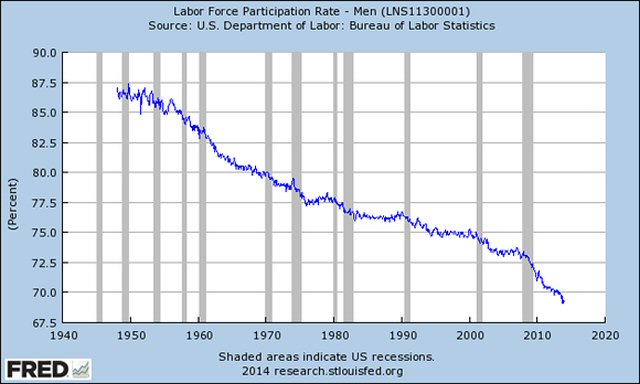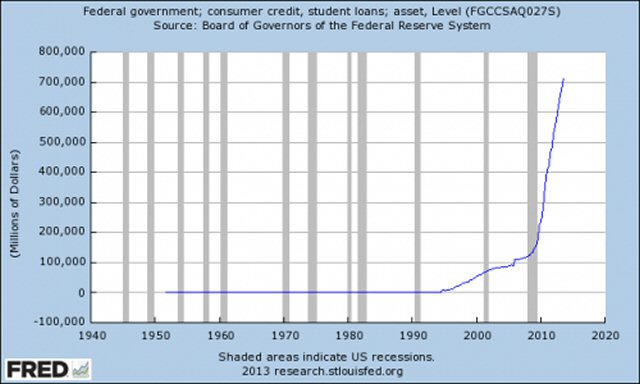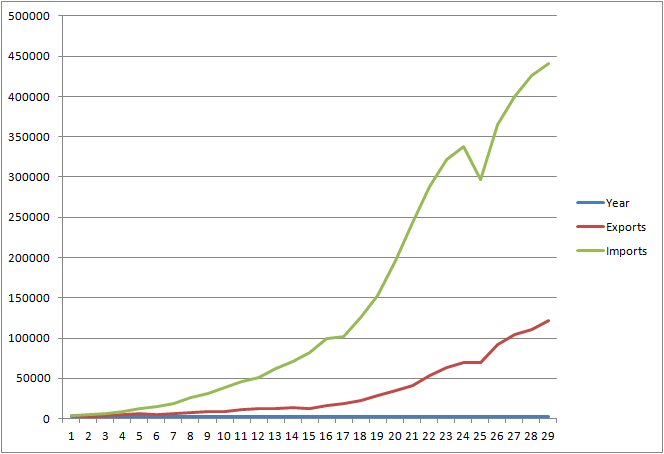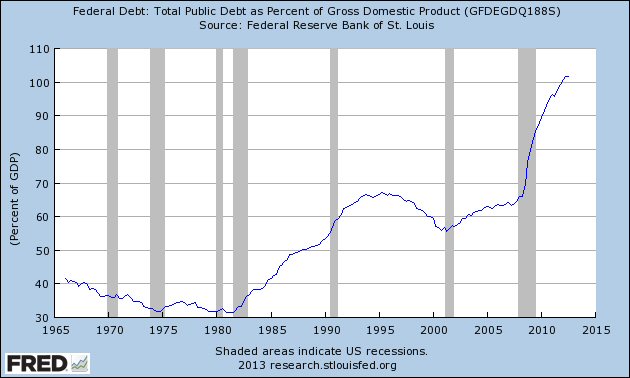Little did President Richard Nixon know, as he announced on television that fateful Friday, August 13th, 1971 the unilateral cancellation of the direct convertibility of the United States dollar to gold, that within just two generations his own words would epitomize the root cause of the American economy’s predicament:
“But if you are among the overwhelming majority of Americans who buy American-made products in America, your dollar will be worth just as much tomorrow as it is today.”
Caught in the unrelenting vise of federal overspending, stagflation, and strong Japanese competition, “opening” China, half of a two-pronged solution, seemed logical: (a) (among other reasons) absorb the world’s largest pool of cheap labor and potential future consumers into a captive market for American-owned industry, and (b) enshrine the dollar as the de facto global reserve currency by securing Saudi Arabia’s agreement to price oil exclusively in dollars in return for American protection of the regime.
But things did not quite work out as anticipated. Whether by design or coincidence, the advent of a global economy centered on Chinese manufacturing dissolved the glue that had held the admittedly antagonistic but certainly reliable symbiotic relationship between American big business and organized labor, the former mainstay of American prosperity. Simultaneously, aided by massive western investment, China’s Peaceful Rise turned the tables and transformed the U.S. into a captive market for Chinese-made products.
Slowly, inevitably, well paying man-jobs in the U.S. were replaced with low-paying jobs with fewer and costlier benefits and nonexistent job security in the retail and service sectors.

The result: a plunging male labor participation rate;

a runaway increase in student debt;
a steep decline in the number of first-time home-buyers and the rate of household formation (almost inversely proportional to student debt),
and a complete lack of new construction of entry-level homes for the working and middle classes. Banks cannot be blamed for their reluctance to lend to these prospective borrowers. Their income is too low relative to the median price of real estate, and job security is virtually non-existent. And why should builders risk building homes for people who cannot afford to buy? Better to buy Treasuries.
The situation is unsustainable and much worse than in 1971. Our infrastructure is crumbling –water pipes, roads, bridges, declining water resources.
America’s Trade Deficit With China 1985-2013

Our chronic runaway trade deficit with China, a consequence of disinvestment in America, continues to add exponentially to the already enormous gap in the distribution of wealth;

and the accumulated federal deficit, currently at $17 trillion, is still growing, albeit at a reduced rate.
Nixon’s solution is unavailable as there are no more untapped markets to absorb, and perpetual economic growth in a finite planet is unrealistic and unsustainable. As for oil, at once a finite asset and a major contributing factor to climate change that does nothing to solve the growing global water crisis and the yawning gap in the distribution of wealth, it can no longer be counted on to perpetuate the dollar’s hegemony.
The dollar’s current strength relative to the euro and the pound is due largely to European internal problems.
However its value relative to the yuan/renmibi is another matter, a reflection of two things: (a) other countries can use the Yuan to buy anything made in China, which is almost everything, and (b) China’s dwindling need or appetite for dollars.
Incidentally, China does not benefit from a decline in America’s purchasing power –its best client. The dollar’s situation is a direct consequence of the actions or inaction, as the case may be, of our elected officials. It means they can fix it.
The U.S., and indeed the world cannot depend on oil for economic/financial reasons and simultaneously repudiate it to combat climate change. Therefore, the dollar’s incipient transition is also a perfect opportunity to usher in, gradually and imperceptibly, a new world order designed to address the needs of the vast majority of people, not just a tiny minority. Given today’s weapons, there’s no real alternative.
Today’s population is 7 billion, projected to increase to 9 billion by 2050. Unless one believes that most will meekly accept a life of abject poverty, each and every one will require some wealth. Here’s the problem. Since time immemorial mankind has used finite materials such as gold, silver, and more recently, otherwise worthless paper as fiat money. One of the reasons for Nixon’s Shock was that there is not enough gold to support the global economy. Accordingly, what’s needed is a sufficiently abundant, recyclable value standard that, over time, with effort and adequate investment will yield enough income to support everyone, promote trade, back all currencies, and end the production of greenhouse gases.
The obvious answer is that hydrogen and solar-generated electricity (specifically earmarked for the production of hydrogen in landlocked countries), or both should be primary criteria to acquire special drawing rights. The world is literally awash with hydrogen. However one does not just go to the beach to fill a container with seawater and expect it to materialize. It requires a profitable, viable scheme, technology, currently in its infancy, and time. But it has advantages that no other element or compound can match.
- It’s fully recyclable. We’ll never run out of it.
- Its byproduct is pure water, the obvious solution to the global water crisis and the only way to manufacture water to irrigate deserts, expand the production of food, and plant trees to help recycle the excess carbon dioxide already in the atmosphere.
- It’s nature’s battery; its potency does not decline when stored.
- There’s enough of it to replace nuclear and fossil fuels to generate all the electricity we’ll require for the foreseeable future.
- Production can be quantified and tracked. No nation would be able to claim higher than actual production figures and use them to boost or diminish the value of its currency.
- It’s an equalizer of wealth. Smaller nations would be able to produce as much as they can to help meet the needs of more populous countries. They would be able to trade on equal terms for the benefit of all.
The time to give this thoughtful consideration and begin discussions is now, while it’s still possible to do so imperceptibly and seamlessly; that is, assuming we really want to avoid unnecessary wars, hot or cold, and make headway with climate change for the benefit of future generations.